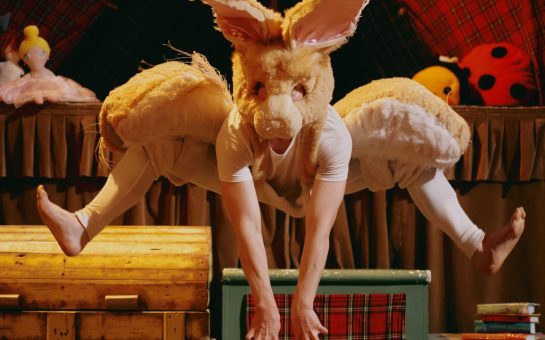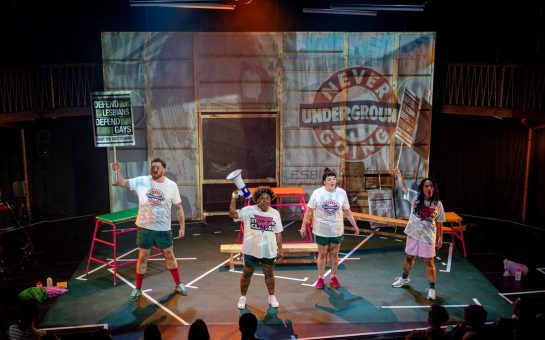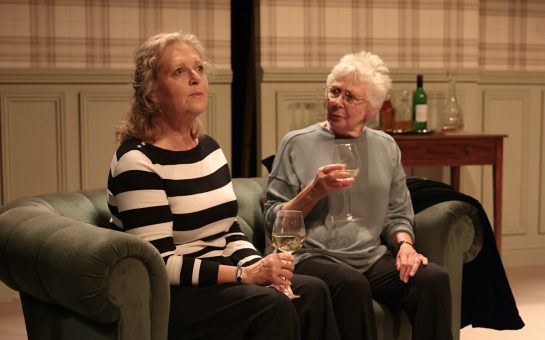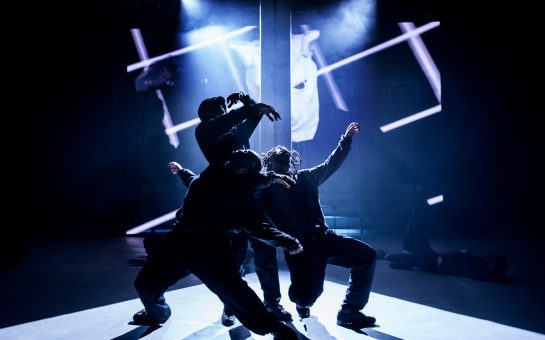Two Mancunian lads wanted to dance for a career. So after meeting in the mid 1990s they set up a company the following decade and the rest is history.
The idea for Company Chameleon was that simple. When Anthony Missen met Kevin Edward Turner at Trafford Youth Dance Theatre more than 20 years ago, they shared an ambition to dance professionally.
After developing their talent, graduating, travelling and working with some of the world’s most innovative dance companies, they came home in 2007 to set up their own company.
Company Chameleon was born.
They were recently recognised by Once Dance UK, winning an award which paid tribute to their significant impact to dance in Greater Manchester.
Like their productions, Kevin and Anthony’s vision for dance is about the big picture: they want to promote dance and its benefits to as many people as they can in the Greater Manchester area and beyond.
Before chatting with Anthony, I had a chance to see a rehearsal of the show at their base just outside of the city in an old primary school. The raw version was captivating and I can’t wait to see the polished version under the lights, on stage and in costume.
Past productions by Company Chameleon have been emotional and thought provoking, they look at human psychology, peel back layers and explore why we act the way we do.
In his first full-length work since the highly rated Beauty of the Beast, choreographer Anthony uses an end of the world hypothesis and Carl Jung’s model of the psyche to delve into the theme of unconscious desires.
In The Shadow six characters and their shadow counterparts are swept into different stories and places, revealing inner worlds, hidden personalities, desires and motivations. The unevolved, primitive, inferior and awkward parts step into the light.
MM: This show has some very deep themes to it, where did the inspiration come from?
AM: First of all, I have always been interested with questions about the human condition and what goes on behind the scenes for people psychologically.
I wonder if this idea was provoked in the beginning with Trump getting into office and Brexit, and all the murmurings that are and aren’t said and this made me think publicly people might do one thing, but privately something else.
If part of your truth is pushed back and there’s no place for it, because we have to live in this world where there are rules and laws and conventions, and we all subscribe to it, there is no place for all this other stuff.
But that doesn’t mean it isn’t real or true, so I want to shine a light on this. We all have it, all of us, everyday, in encounters you have with people you might want to say exactly what’s on your mind, but you can’t really do that.
If everyone did that all the time there would be anarchy and chaos.
MM: The show is largely based on Carl Jung’s Analytical Psychology, has this always been an interest for you?
AM: I have always read a lot about psychology and psychoanalysis and I have been interested in Jung’s philosophy for quite a long time, I find the whole thing fascinating to find out about who we are and the show just came out of that really.
The interesting bit for me is everybody has three faces: a public face, the face that you show your friends and family, and the face that you don’t show anyone, and supposedly that is your truest likeness.
Your shadow is the part of your self that you aren’t aware of, but it still has an effect on you, it’s just that you don’t really know what it is or where it’s come from. But it’s there.
There is also the challenge of it, how can I possibly make a theatrical production that looks at these parts of ourselves that are hidden or repressed or pushed back.
MM: So would you say that The Shadow is your fourth face then?
AM: In a way it is, it’s just you’re not aware of it. You can start to look at it and become aware and work out how to integrate that into your life and being.
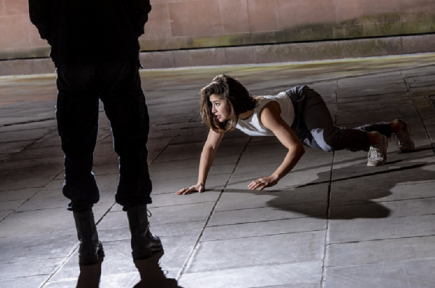
Nobody is good or bad: we are not polar beings. I think you can’t push one side and push the other away, because first it finds a way out one way or another, maybe some behaviour or some random thing that you say. Also we need to find the equilibrium because all of us are light and shade and to not acknowledge the shadow is dangerous, I don’t think it makes you a whole person. The shadow needs satisfying in some way.
MM: Do you think then that dance and movement can help to improve our health not only physically but mentally as well?
AM: Dance or movement is such a basic instinct to humans, we have always expressed with our bodies from such a long time ago. If we talk about kinesthetic empathy, if you see somebody else dancing and what the dancer is feeling is real and true, then the same feelings fire in you. So in some sense you are going to experience the same thing if it’s real and it has an honest source.
I think that is what I have tried to do when making anything, how can we create something that people can really understand and feel and connect with. It may not be a conceptual understanding but there will be something about it that you will just know and you will understand.
I try to open that gateway so that somebody who has never watched any dance shows before, it doesn’t matter, you will feel something or relate yourself to it or your brother or your mum or your wife or your mate.
The beauty of dance is it’s a universal language, there is freedom in it, you can bring your own experience to it.
MM: How did you go about choreographing the show, trying to express something which is unseen or unknown?
AM: Some of the moves I tried to think ‘What am I trying to express?’ and ‘What can I create that says that?’. On the opposite side of it a lot of the moves have been sourced from the dancers. For example, we did a series of improvisations around inferiority and what that means.
Then I developed ideas from that. Somebody will have done something and I would go ‘Yes, that totally says something and it’s really interesting, where can we go with that’. Then it’s trying to figure out how can I put this together in a format that is going to make sense for an audience, that is going to take them on a journey.
MM: Did the dancers find it cathartic or perhaps terrifying going to these hidden places mentally?
AM: Everyone has had crazy dreams, but it’s been different for different people. Some people are more comfortable to go in and share, but for some people it has taken longer because they are more guarded, so I have to meet them where they are.
I think everyone has gone on a real journey inside themselves, they have gathered an awareness of things they hadn’t really thought about too much before. Around that I have to be sensitive knowing we are opening doors or gateways or wounds. Everyone is supported by everyone and that had to come first for people to feel safe to go to that place.
There has been such a wonderful generosity from all the dancers to open themselves up because a lot of what you see in the show is stuff that has come from them, I have given the keys and shaped it but a lot of it is about them in the show and that is brave, they are an amazing group of people and it is a privilege to be able to work with them.
The Shadow will be on at HOME on Friday and Saturday November 22/23 at 20:00.
